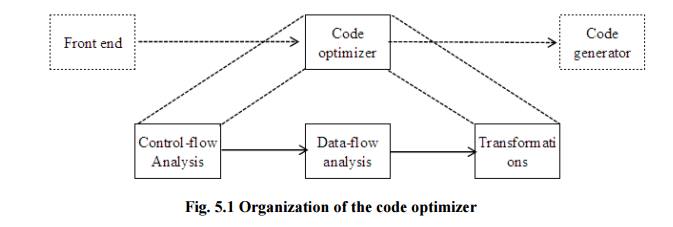Chapter: Principles of Compiler Design : Code Generation
Code Optimization
CODE OPTIMIZATION
INTRODUCTION
The code produced by
the straight forward compiling algorithms can often be made to run faster or
take less space, or both. This improvement is achieved by program
transformations that are traditionally called optimizations. Compilers that
apply code-improving transformations are called optimizing compilers.
Optimizations are classified into two categories.
They are
•
Machine independent optimizations:
•
Machine dependant optimizations:
Machine independent optimizations:
• Machine independent
optimizations are program transformations that improve the target code without
taking into consideration any properties of the target machine.
Machine dependant optimizations:
• Machine dependant
optimizations are based on register allocation and utilization of special
machine-instruction sequences.
The criteria for code improvement
transformations:
Simply stated, the best
program transformations are those that yield the most benefit for the least
effort. The transformations provided by an optimizing compiler should have
several properties. They are:
1.
The transformation must preserve the
meaning of programs. That is, the optimization must not change the output
produced by a program for a given input, or cause an error such as division by
zero, that was not present in the original source program.

Fig.
5.1 Organization of the code optimizer
2.
A transformation must, on the average,
speedup programs by a measurable amount. We are also interested in reducing the
size of the compiled code although the size of the code has less importance
than it once had. Not every transformation succeeds in improving every program,
occasionally an “optimization” may slow down a program slightly.
3.
The transformation must be worth the
effort. It does not make sense for a compiler writer to expend the intellectual
effort to implement a code improving transformation and have the compiler
expend the additional time compiling source programs if this effort is not
repaid when the target programs are executed. “Peephole” transformations of
this kind are simple enough and beneficial enough to be included in any
compiler.
Flow analysis is a
fundamental prerequisite for many important types of code improvement.
Generally control flow analysis precedes data flow analysis. Control flow
analysis (CFA) represents flow of control usually in form of graphs, CFA
constructs such as control flow graph, Call graph. Data flow analysis (DFA) is
the process of asserting and collecting information prior to program execution
about the possible modification, preservation, and use of certain entities (such
as values or attributes of variables) in a computer program.
Related Topics